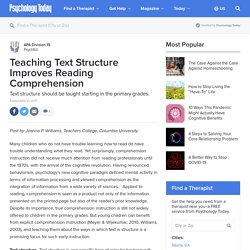

5 great reasons to extend activities. Published 10 October 2017 Following on from yesterday’s article on classroom activities with scissors, Robert Dobie shares 5 reasons for incorporating extension activities in your lessons, and provides a free worksheet download too!

It’s tempting to look at what happens in ‘our’ classrooms first and foremost from a teacher’s perspective, and so as an ESL teacher, we might sometimes feel a little guilty when we hear the phrase ‘extend an activity’. It might conjure up images of a teacher too lazy or time-stressed to think of new, additional activities and tasks to fill the time we have with our learners. Well, leave the guilt aside because, in fact, extending a classroom activity has major benefits for our learners. Teaching Text Structure Improves Reading Comprehension. Post by Joanna P.

Williams, Teachers College, Columbia University. Action Research - Stop, Start, Continue. I get students to brainstorm all the kind of things I as a teacher do and things which we do in class. Some examples might be: TeachingEnglish. TeachingEnglish. British English Vocabulary. Free Classroom Resources. What Aristotle and Joshua Bell can teach us about persuasion - Conor Neill.
A Framework for Ethical Decision Making. Thinking Together, University of Cambridge » Resources for Teachers. This page has some resources for teachers and teacher-trainers to use to develop their own and their students' awareness of how talk is used in classrooms. Many more useful resources can be found in the books for teachers listed on the publications web page! Journal of Philosophy in Schools. Journal of Philosophy in Schools Call for papers The Official Journal of the Federation of Australasian Philosophy in Schools Associations Website:

An Interview with Dr. Judy Willis. Neurologist and Neuroeducation consultant What is neuroplasticity and how does it relate to learning?

Neuroplasticity refers to the brain’s ability to change or adapt after experiences. Memory is held not in individual neurons, but rather in multiple neurons in communication with one another. Neurons that regularly communicate with each other to represent knowledge and memories are referred to as a neural network. However, one of the most important findings for education is that the brain and its connections are “plastic”; that is it has the ability to change. As educators, we are ‘brain changers’ because we promote learning through experiences that activate students’ neural networks as their brains construct memories and knowledge.
MIT Brain Study: Back-And-Forth Talk Key To Developing Kids' Verbal Skills. Sign up for the CommonHealth newsletter to receive a weekly digest of WBUR’s best health, medicine and science coverage.

New MIT research finds that for children's brain development, parents don't just need to talk to their kids — it's important to talk with them, in back-and-forth exchanges. Story continues below Most Viewed Stories "What we found is, the more often parents engaged in back-and-forth conversation with their child, the stronger was the brain response in the front of the brain to language," said cognitive neuroscience professor John Gabrieli. That stronger brain response, measured as children ages 4 to 6 lay in a scanner listening to simple stories, reflects a deeper, more intimate engagement with language, said graduate student Rachel Romeo.
Effective Teacher-Child Interactions. A longitudinal investigation of the role of quantity and quality of child-directed speech in vocabulary development. User Data and Cookie Consent. I Said I Want the Red Bowl! Responding to Toddlers' Irrational Behavior - Expert Tips & Advice . PBS Parents.
Pin It Amelia, told that she can’t have a fifth book before bedtime, shouts: “You are the meanest mommy!

You are not invited to my birthday party!” Derek, when offered a choice between carrots and cheese, not ice cream, before dinner announces: “I don’t like the choices you are choicing me!” Alex hurls a bowl of his favorite cereal off the table and screams, “I said the red bowl, not the blue bowl!” If any of these exclamations sounds familiar, you are not alone. But seen through the eyes of the child, and through the lens of development, these behaviors, while maddening, are utterly normal, and signal important milestones are being achieved.
Schemas in Children’s Play - N a t u r e P l a y. Written by Clare CaroSchemas in Children’s Play are such an important concept when it comes to the development of our children that it’s worth taking the time to understand them so you can facilitate them when you see them.What are these schemas?

Well it’s really a fancy word for the urges that children have to do things like climb, throw things and hide in small places. They appear through play; perhaps it is the way they choose to do things, or what they desperately need to do out of the blue! Schema and Fairies - Kathy Brodie Early Years Training. Schemas are one of those things that divide practitioners, like fairies at the bottom of the garden.

You either believe in them and are in absolute awe at how amazing they are, or you just don’t believe they exist. It’s really interesting when you discuss this with people and it’s extra exciting when a ‘non-believer’ suddenly says “That describes my key child exactly!!” FAQ: Raising Bilingual Children.
Why want bilingual children? There are many reasons, but the two most common are: 1) The parents speak different languages (say, an American woman and a Turkish man). 2) The parents speak the same language, but live in a community where most people speak something else (say, a Korean couple living in the USA). In the first case, both the mother and father may want to be able to use their own language when talking to their children. This is the bilingual home situation. Symbolic play and language development. 1. Introduction 1.1. Deconstructing Role Play – Provide the Resources, Step Back and Watch Children’s Learning Flourish. Hospital, vet’s surgery, post office, travel agent – themed role play areas are often seen as a must for an early years setting.
They are often meticulously prepared to be aesthetically pleasing, covered in laminated words and pictures with the aim of enticing children in. But this is where I encountered a problem: in these areas, children are expected to come together to play out adult scenarios that are consistent with these themes. The cognitive benefits of play: Effects on the learning brain. © 2008 - 2014, Gwen Dewar, Ph.D., all rights reserved Science supports many of our intuitions about the benefits of play. Playful behavior appears to have positive effects on the brain and on a child’s ability to learn. In fact, play may function as an important, if not crucial, mode for learning.
Why Movement is Essential in Early Childhood. The Remarkable Rocket - Storynory. Play. How young children learn English through play. The Christian Science Monitor. On-line Newspapers as a Source for Language Teaching Material. OM TOEFL Gratis-Preparacion Gratuita del TOEFL Test of English as a Foreign Language-Curso de toefl gratis, cursos de Ingles Gratis On line. Cambridge English Examiner Management. Concorsi tempo indeterminato - Università degli Studi di Milano. Let's Talk. Deb Roy: The birth of a word. How young children learn English as another language. By Opal Dunn, educational consultant and author.

Alison Gopnik: What do babies think? Patricia Kuhl: The linguistic genius of babies. KQED Public Media for Northern CA. Does being bilingual make you smarter? Language teacher and researcher Miguel Angel Muñoz explains the latest research on how being bilingual affects your brain, ahead of a British Council seminar in Cardiff on whether learning a foreign language makes you smarter. You can watch the live-streamed seminar on Tuesday, 3 June.
More than half the world's population uses two or more languages every day. A few more myths about speakers of multiple languages. Does multilingualism cause language delays and identity problems? The British Council's Nayr Ibrahim busts a few more myths about speakers of multiple languages. What happens in the brain when you learn a language? Learning a foreign language can increase the size of your brain.

How Children Learn to Talk. Have you ever wondered how children learn to talk? Many people, when asked that question, respond that they do it by imitating.